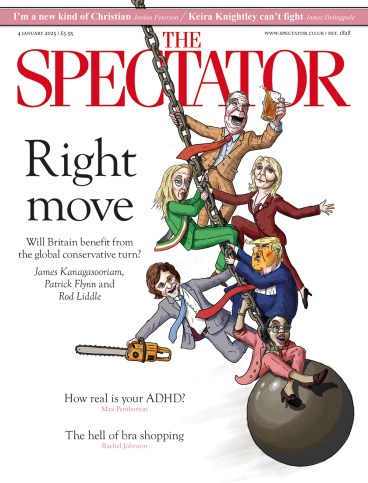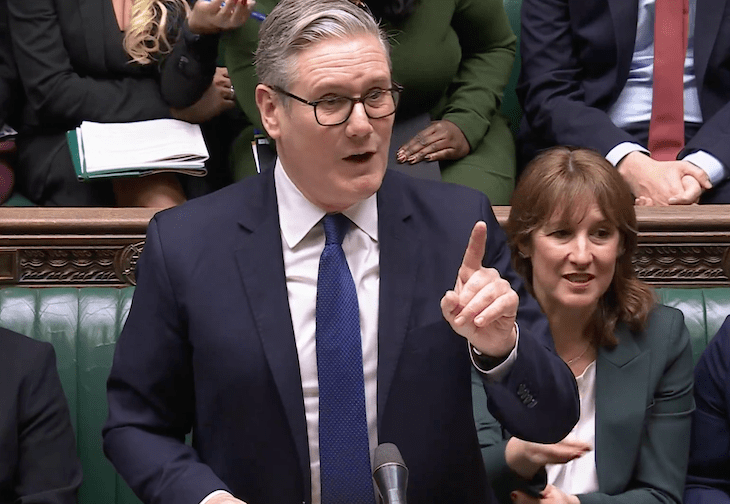
On Christmas Day, 12 million people watched the will-they-won’t-they couple Smithy and Nessa finally marry after 17 years in the finale of the hit BBC comedy series Gavin and Stacey. Yet for all the cheery sentiment, it’s a depressing thought that – statistically – in the real world the characters would be earning roughly the same amount at the series’ end in 2024 as they were at its beginning in 2007.
Rachel Reeves’s task this year is to spring Britain from its low-growth trap. The early signs are not encouraging. Those captains of industry whom she once so assiduously courted are turning hostile. The Confederation of British Industry says private sector expectations are at their lowest since Liz Truss’s ‘mini-Budget’ fiasco. The Bank of England predicts 0 per cent growth for the Chancellor’s first six months. Gleeful Tories talk about a ‘Reevescession’ that is ‘made in Downing Street’.
Reeves’s allies argue that much of the criticism is unfair. After 14 years of anaemic Tory rule, they say, Reeves’s invidious position is not of her own making. Some partisans echo Jim Callaghan, another Labour chancellor bruised by capital: ‘Because of the prejudices of the City,’ he grumbled, ‘the Labour government always has to do rather more.’
Some of Reeves’s critics say she has been too willing to follow ‘Treasury orthodoxy’. Successive ministers at the Treasury have been offered, and declined, the option of cutting winter fuel and agricultural relief. Yet Reeves accepted, sparking a backlash disproportionate to how much the change will save. ‘She swallowed their list of shit,’ says one former minister. Some in Labour fear that, in her zeal to balance the books, Reeves risks functioning more like a souped-up chief secretary than a creative Chancellor of the Exchequer. ‘In 1997, our first move on taking office was giving the Bank of England independence,’ says one New Labour veteran. ‘Rachel’s was to axe winter fuel.’
Nevertheless, Reeves, a keen student of history, is said to be aware of her department’s blind spots. Her new year’s resolution for the Treasury is to become a growth ministry. A series of Mansion House-style events will be held to remove growth barriers in sectors such as clean energy, life sciences and defence. Her deputy, Darren Jones, is one of the leading cabinet evangelists on AI’s potential for the public services, alongside Peter Kyle and Wes Streeting.
Treasury mandarins are also working with Angela Rayner’s officials on the Planning Bill – the great hope for supply-side reform. A glut of papers has already appeared aimed at encouraging planning officers to adjust their behaviour. Support is offered from the Labour Growth Group, which has 99 MPs in its WhatsApp group. Members are liaising with the new Good Growth Foundation thinktank on the messaging and meaning of economic policies for voters.
Gleeful Tories talk about
a ‘Reevescession’ that is
‘made in Downing Street’
As one MP puts it: ‘The reason we are focused on growth is we don’t want to have any more difficult spending reviews.’ The next review is due in June and Reeves wants to find savings of 5 per cent. At cabinet, she faces an array of ministers whose demands must be handled with care. A fresh battle looms on defence, and the conclusion of the ongoing strategic review will inevitably reopen arguments about raising spending in the sector to 2.5 per cent of GDP.
Reeves is a Labour operator to her core. She regularly breakfasts with colleagues and visits the Members’ Tea Room after Treasury questions. ‘Rachel really gets the party, in a way the PM doesn’t,’ says one MP. ‘She’s almost at her happiest when she’s doing the tribal stuff.’ And yet her position is much more vulnerable than it was in opposition. Ahead of internal elections in the spring, unions have made rumblings over nurses’ pay. The 37 Scottish Labour MPs are conscious of Holyrood elections next year – Scottish leader Anas Sarwar has lambasted Reeves’s moves over winter fuel and Waspi women. The Treasury’s refusal to compensate female pensioners also sparked fury on the Labour WhatsApp group. Tellingly, it was that exchange, rather than similarly fraught arguments on assisted dying, which was leaked to the press.
Inevitably, frustration at the Prime Minister is directed at Reeves too. ‘Keir should be fronting more of this stuff,’ says one party figure, who contrasts Starmer’s newfound enjoyment of foreign affairs with his apparent apathy on economics. In the second year of this parliament, the relationship between Nos. 10 and 11 is particularly important. ‘There’s something to be said for a bit of creative tension,’ remarks one minister, ‘so long as there’s not too much tension.’

Conservatives watch with grim fascination, keen to highlight Labour’s pre-election pledge not to raise national insurance. ‘The “broken promises” narrative is going to be endless,’ says one. Yet the Tories have their tensions too. Some, such as shadow chancellor Mel Stride, are more willing to defend the last government’s economic record than others. One shadow cabinet member predicts there will be a ‘repentance speech on the economy’ for the mistakes of the 2019 to 2024 regime.
Reform, meanwhile, is on hand to exploit economic unease. The party touts a mix of tax cuts and protection for strategic industries such as steel – though even the Institute for Fiscal Studies warned that Reform’s last election costings were out by ‘tens of billions’. ‘What’s Nigel Farage’s answer on the economy?’ Reeves asked the Guardian recently. ‘How’s he going to grow the economy? He’s not got the faintest.’ She and colleagues have so far rejected Reform’s call to renationalise Thames Water. The Treasury is worried about the effect on the nation’s balance sheet, especially now that borrowing costs are up to mini-Budget levels. But for many Labour voters such proposals are not without appeal.
The ghosts of chancellors past haunt No. 11. Not for nothing did Gordon Brown joke that there are only two sorts of chancellors: those who fail and those who get out just in time. It is still early days, but unless her growth plans start to bear fruit soon, Reeves looks destined to be the former.








Comments